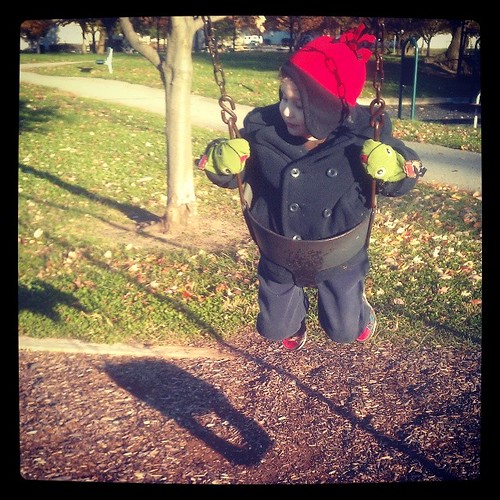Wait a minute. Did she just say my son looked gay?
That’s what ran through my mind after a comment from an elderly acquaintance. I was dressing my 3-year-old son in his Navy blue pea coat after a Thanksgiving luncheon at the YMCA. On his head I placed the red and black fleece hat that covers his ears, topped with a tassel made of fleece strips. That’s when the woman said, about his winter get-up, “If I’d put that on my sons, they would have told me ‘That looks gay, Mom’.” Perhaps noticing the stunned look on my face, she quickly added, “I like that coat, and the hat, too.”
I just answered, “They shouldn’t talk like that.”
She was in her 70s, and explained that her sons were in their 50s now, as if that made it OK. Yes, they’d grown up decades before the advent of sensitivity to lesbian and gay issues, but I still don’t buy that as an excuse. My parents don’t talk that way, and they both turned 70 this year. They learned to respect other people. It might sound harsh, but I believe this woman has herself to blame for her son’s attitudes. Children learn what they hear. More importantly, they learn from silence, just as much as from what’s spoken.
This incident came on top of another disturbing incident. A classmate from my water aerobics class told me her grandson, who is just starting school, complained to his mother that the other boys called him a “Tinkerbell” because he speaks proper English. Who is teaching these kids that it’s all right to call people who are different “gay”? And why isn’t anyone telling them it’s not OK?
I remember being a camp counselor at a summer camp affiliated with the United Church of Christ back in the 1980s. Some campers seemed to think that calling something you didn’t like — or someone who was different — “gay” was absolutely acceptable. After all, it wasn’t considered swearing and it wasn’t regarded as being as offensive as a variety of other epithets. Long before the current growth in awareness about the topic, I used to pull kids aside and tell them that it was not appropriate to call other kids that name, that it was hurtful because it singled them out for being different. I also added that there’s nothing wrong with being gay, if you are, and that using the word as an insult implies that it is a bad thing.
I don’t know if I made any difference in those kids’ lives, but I hope I did. I know how impressionable I was when I was younger, and I know how much it impacted me when adults called me to task for my language or behavior. I’d love to think that my words made them think about, and better yet, change their behavior, and maybe even pass along what they’d learned.
If we want kids to stop insulting each other using the term “gay,” we’ve got to come off the sidelines. We can’t excuse it by saying “boys will be boys.” That means speaking out, whether it’s your kids or someone else’s. I firmly believe that, and I have been practicing that tactic for many years now.
We will never be able to stop kids from teasing each other or calling each other names. But if we all speak out against this particularly virulent kind of name calling, hopefully we can make it as unacceptable to call someone the “G” word as to call someone the “N” word.
Let’s take a stand and change the language on the playground.

